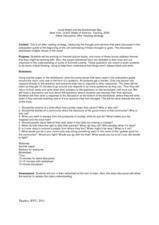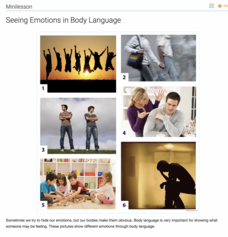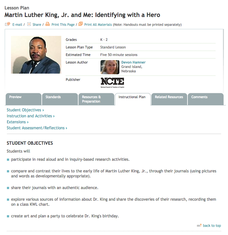Brigham Young University
Silent Discussion: After Reading Strategy for Lizzie Bright and the Buckminster Boy
Complete this after-reading activity for the novel Lizzie Bright and the Buckminster Boy in order to explore the books themes of societal prejudice, peer pressure, authority, and bullying. Write the seven provided questions on...
Institute for Teaching through Technology and Innovative Practices
The Right Number of Elephants
How can you tell if a number of items is reasonable? Combine math and language arts with a fun lesson based on Jeff Shepard's The Right Number of Elephants. After reading the book, kids discuss amounts of other items and create minibooks...
West Corporation
Making Inferences – Use Your Mind to Read!
How can you tell if someone is happy? The lesson works with elementary and middle school scholars to activate their schema and pay attention to details to make inferences in their daily lives, poetry, and other literature. Cleverly...
Curated OER
Narrative Writing
Second graders select and read a variety of stories and discuss what happened in the story that made the day so special. Using a graphic organizer, 2nd graders brainstorm ideas about their best day at school. They compose a story...
Utah Education Network (UEN)
Jack and the Beanstalk: Measurement Ideas
Have fun with Jack and his beanstalk! Primary learners will practice skills at various activity centers, including: weight measurement, money, art, nonstandard length measurement, problem solving, music, reading, and writing. Every...
Tuscaloosa County School System
National Flat Lorax Project - AP Environmental Science
Whether it's Earth Day or another average school day, there are always ways we can protect our planet. An environmental science project combines The Lorax by Dr. Seuss and the Flat Stanley Project to create an innovative assignment for...
Thoughtful Learning
Seeing Emotions in Body Language
Scholars test their skills of reading body language with a collaborative learning experience that focuses on showing and identifying emotions. Pairs take turns acting out an emotion, one uses body language while the other guesses what...
Curated OER
Digging Up Dinosaurs
In this dinosaurs worksheet, students read a nonfiction book about dinosaurs and then answer 6 comprehension questions and present an oral presentation.
Curated OER
Mythology: Reader's Theater
Build reading fluency and classroom community with a Reader’s Theater activity. Class groups select a myth, or if part of a myth writing unit, select a group member’s myth, craft a script, and perform for the class. Directions for...
Curated OER
Activity Guide for Snow
Create a cross-curricular learning experience around a shared reading of Cynthia Rylant's book Snow. From writing poetry and a singing a song about snow, to creating paper snowflakes and solving math story problems, this resource uses...
ReadWriteThink
Martin Luther King, Jr. and Me: Identifying with a Hero
Here, young historians compare their early lives to that of Dr. Martin Luther King Jr.'s. They listen to a read aloud of a story by Dr. King's sister, and then write in the provided reflective journal template. Lastly, they share their...
Curated OER
Unit 7: Family Celebrations - Day Three: Describing Pets
English language learners examine advertisements for pets and pet shelters. Students read advertisements about pets who are living in shelters. They answer comprehension questions based on the reading before writing an original...
Curated OER
Rehearsing the Fashion Show
Students edit written work about a fashion show. In this fashion show lesson plan, students write a presentation piece and works in groups of 4,6, or 8 to edit what they have written. Students rehearse by pair sharing and give their...
Curated OER
Pride and Prejudice: KWHL
How much does your class know about the setting of Pride and Prejudice? Explore Jane Austen's romantic world with a KWHL chart that helps kids note what they already know about 18th century England, what they want to know, how they will...
Curated OER
The Study of Theme and Figurative Language in Poetry and/or Prose
Identify and analyze the use of figurative language used in select pieces of writing. These pieces of literature will represent at least two pieces by one writer and at least two pieces by different writers. This lesson plan would be a...
North Carolina Museum of Natural Sciences
Weather Watch Activity Guide: Groundhog Day
Exactly what do groundhogs know about weather? Not as much as your science students will after completing these lessons and activities that cover everything from the earth's rotation and the creation of shadows, to cloud...
Wuthering Heights
The Reader’s Guide to Emily Bronte's Wuthering Heights
Researching the characters, setting, and background history of a work of literature enhances interest and improves reading comprehension. An interactive website contains a wealth of resources related to Emily Bronte's novel Wuthering...
Curated OER
Chinese New Year
Gong hei fat choy! Celebrate Chinese New Year with a variety of activities that introduce learners to the Chinese myth of the race that determined which animals earned their place the zodiac.
Curated OER
ESL Lesson Plan
Students listen to a story and comprehend, in a manner of writing down the story sentence by sentence, possibly in the exact words. They read their own writings to others and make them understand.
Curated OER
Dear Character
Third graders examine and better explain a character and their traits by writing a letter from their point of view.
Curated OER
Writing in Math Class
Students brainstorm and discuss ways math is all around them, explain in writing how they solve math problems, describe mathematical ideas in writing, and create original story problems.
Curated OER
Yearbook Interviews
Students apply interview techniques for yearbook articles. They interview the teacher and classmates. They must write questions that are grammatically correct in order to have them answered by the teacher.
Curated OER
What are Numbers?: Learning to Add
Students identify numbers from 0-20. They show quantities to 20. Students work in small groups and take pictures of items demonstrating the numbers that they have beeen taught. They form the number shape using their bodies and take...
Curated OER
Fall vs. Spring
Young scholars compare and contrast the seasons of fall and spring. In this fall and spring lesson plan, students learn the differences between fall and spring through books and pictures, identify the differences, draw their own...
Other popular searches
- Create Picture Book Writing
- Writing Picture Books
- Writing a Picture Book
- Picture Book Writing Lessons

























